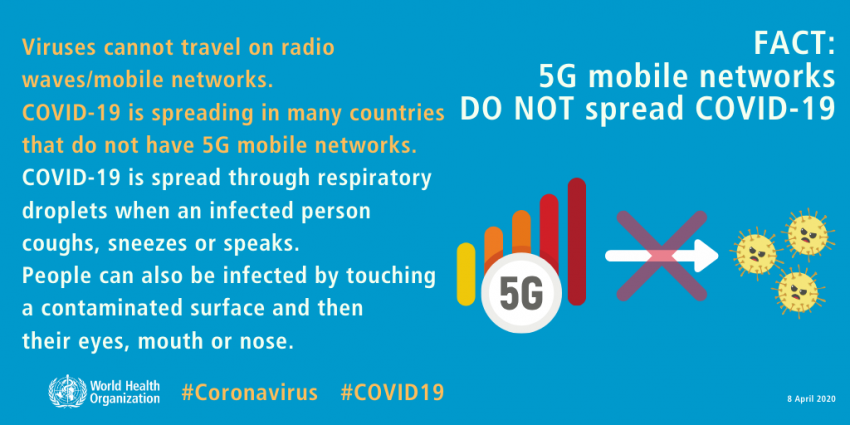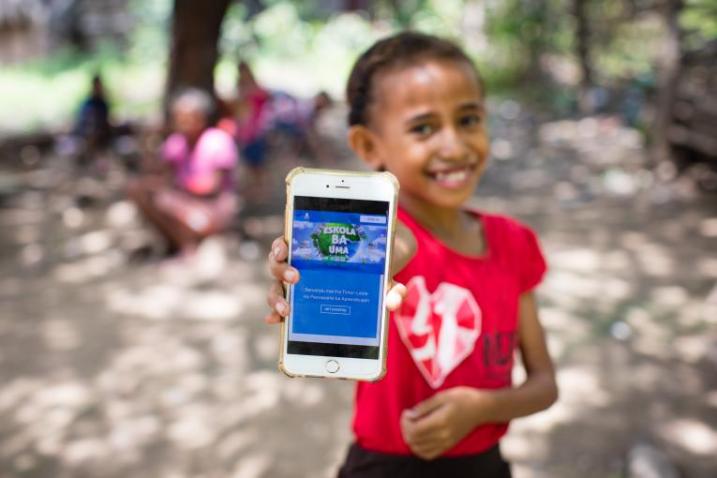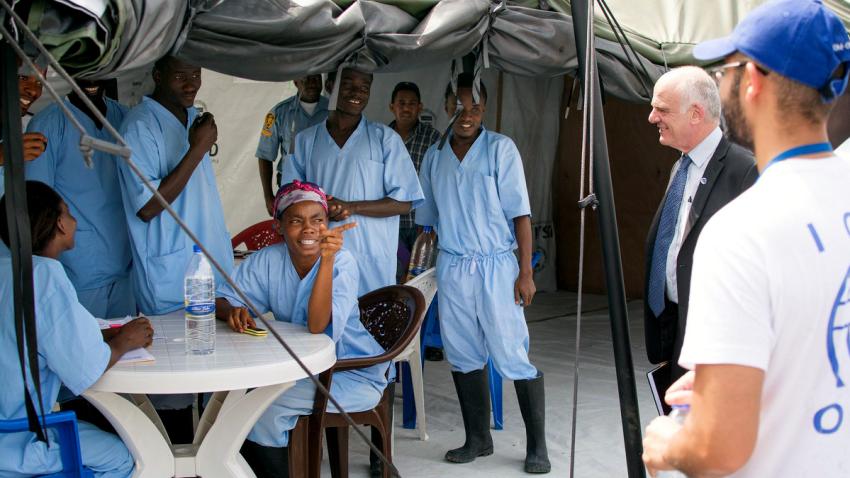30 April 2020 — From misinformation about the use of disinfectants to combat the coronavirus, to false claims that the virus can spread through radio waves and mobile networks, unreliable information is hurting the global effort to defeat the COVID-19 pandemic. By dispelling rumours, fake news, and messages of hate and division, the United Nations is working to spread accurate information and messages of hope and solidarity.
To rally forces behind this effort, the United Nations is launching a new COVID-19 Communications Response Initiative based on science, solutions and solidarity to fight misinformation.
“Fear, uncertainty, and the proliferation of fake news have the potential to weaken the national and global response to the virus, bolster nativist narratives and provide opportunities for those who may seek to exploit this moment to deepen social divisions,” said Melissa Fleming, Under-Secretary-General for Global Communications, who will lead the campaign. “All this threatens to undermine the international cooperation urgently needed to deal with the impacts of this crisis.”
A rapid response team is being formed to help share facts and science to overcome a surge of misinformation, she said.
Here are some examples of how the United Nations is tackling the spread of misinformation.
Tune in now to the #AIforGood webinar to ask your questions on #AI, #misinformation + #FakeNews on #COVID19
— ITU (@ITU) April 17, 2020
https://t.co/nFzgQ3jpFo pic.twitter.com/j5QhSyONbu
1. Producing and disseminating facts and accurate information
The World Health Organization (WHO), which is at the forefront of the battle against the pandemic, is transmitting authoritative information based on science while also seeking to counter myths.
Due to the high demand for timely and trustworthy information about COVID-19, WHO has established the Information Network for Epidemics (EPI-WIN) that unites technical and social media teams working closely to track and respond to misinformation, myths and rumours and provide tailored information and evidence for action.
For instance, when the first confirmed case of COVID-19 was reported in Uganda, some communities in the country’s north believed that the virus was caused by evil spirits and performed rituals to “push the spirits back to the West.” Hate speech targeted at foreigners within the communities began to increase. The Ugandan Government took on a more active role in addressing the virus and disseminating accurate information from WHO. Many precautionary measures from WHO and the Government were translated into local languages to raise awareness among various communities, especially those in remote, hard-to-reach areas with limited access to digital information.
United Nations country teams and missions on the ground are using all available channels, such as radio and social media to dispel rumours and counter misinformation, while the Organization's 59 UN Information Centres are also taking the lead in fighting disinformation in local languages.

2. Partnering with businesses
Partnering with WhatsApp and Facebook, WHO launched dedicated messaging services in several languages, including Arabic, English, French, Hindi, Italian, Portuguese and Spanish, to share critical guidance on COVID-19. This easy-to-use messaging service could reach up to 2 billion people and allows WHO to get the facts directly into people’s hands.
WHO also partnered with Rakuten Viber to launch a new interactive chatbot which aims to get accurate information about COVID-19 to people in multiple languages. This partnership gives WHO the potential to reach over 1 billion people in their local language directly through their mobile phones.
WHO and the International Telecommunication Union (ITU), with support from the United Nations Children's Fund (UNICEF), are calling on all telecommunication companies worldwide to join their initiative to help unleash the power of communication technology to save lives from COVID-19 through text messages. An estimated 3.6 billion people remain offline, most of whom live in low-income countries, where an average of just two out of every ten people are online. These text messages will reach billions of people who are not able to connect to the internet for information.
3. Working with media and journalists
The United Nations Educational, Scientific and Cultural Organization (UNESCO) has published two policy briefs that assess the COVID-19 ‘disinfodemic’ of falsehoods, fabrications and misinformation. The policy briefs were supported by the International Center for Journalists (ICFJ), which is assisting journalists working on the frontlines of the “disinfodemic” around the world, to ensure accurate, trustworthy and verifiable public health information reaches communities everywhere.
More than ever, the world needs professional journalism & reliable information to fight the spread of #COVID19, organize itself, learn from each other & debunk rumors & disinformation.
— UNESCO (@UNESCO) April 24, 2020
Get the right tools & advise from @UNESCO: https://t.co/tONUTd9QHN #coronavirus #ShareKnowledge pic.twitter.com/I6Kf2FbMVD
The Bureau of UNESCO’s International Programme for the Development of Communication (IPDC) has approved several initiatives in Africa, India and the Caribbean. “In developing countries, the coronavirus crisis can only aggravate an already challenging environment for the media, particularly for community media which often lack capacity and resources, but which service the most vulnerable communities,” said UNESCO Assistant Director-General for Communication and Information, Moez Chakchouk.

The initiatives seek to:
- connect a group of 200 Eastern African women journalists through an on-line resource hub that provides training materials on how to cover the outbreak;
- help a network of 25 community radio stations in Eastern and Southern Africa serving 250,000 citizens living in rural and marginalized communities better cover the Coronavirus-related challenges in these remote areas;
- support 25 community media closely work with the disaster management authorities to reach a wide general audience, but most particularly tribal and marginalized communities; and
- empower 50 media professionals in nine Eastern Caribbean countries to conduct effective fact-checking and counter disinformation and sensationalism on coronavirus.
4. Mobilizing civil society
The United Nations works closely with thousands of civil society organizations around the world that are associated with the UN Department of Global Communications (DGC) and affiliated with the Economic and Social Council (ECOSOC).
DGC provides key sources of information for non-governmental organizations (NGOs) on opportunities to access, participate in and contribute to UN high-level processes and events including briefings during this unprecedented period of lockdown. Its weekly newsletter reaches some 1,900 organizations globally. The Department has put out a call asking NGOs worldwide to share their stories that highlight how they are contributing to the global response to COVID-19 and how they are using WHO guidelines to inform their activities. The Department is also encouraging all NGOs to act on science, share solutions and inspire solidarity.
Together with WHO, DGC also launched a global civil society survey about COVID-19 to learn what misinformation, stigma and myths are circulating around the world and threatening the global response.
“It is imperative for the UN to continue to benefit from the expertise, experience and partnership of civil society worldwide, including youth,” said Jeffrey Brez, Chief of DGC’s Civil Society and Advocacy Unit. “WHO already has excellent networks and we hope this additional information will allow the UN at large to communicate as effectively as possible, flatten the curve and save lives and livelihoods.”
The survey is also an opportunity for NGOs to play a part in actively sharing accurate information that they can find on http://www.who.int and https://www.un.org/coronavirus, he said.
5. Speaking out for rights
Michelle Bachelet, UN High Commissioner for Human Rights, recently spoke out against restrictive measures imposed by several States against the independent media, as well as the arrest and intimidation of journalists, saying the free flow information was vital in fighting COVID-19.
“Some States have used the outbreak of the new coronavirus as a pretext to restrict information and stifle criticism,” Bachelet said. “A free media is always essential, but we have never depended on it more than we do during this pandemic, when so many people are isolated and fearing for their health and livelihoods.”
“Credible, accurate reporting is a lifeline for all of us,” said the UN human rights chief, who also noted that some political leaders had directed statements towards journalists and media workers that created a hostile environment and compromised their safety and ability to do their work.




